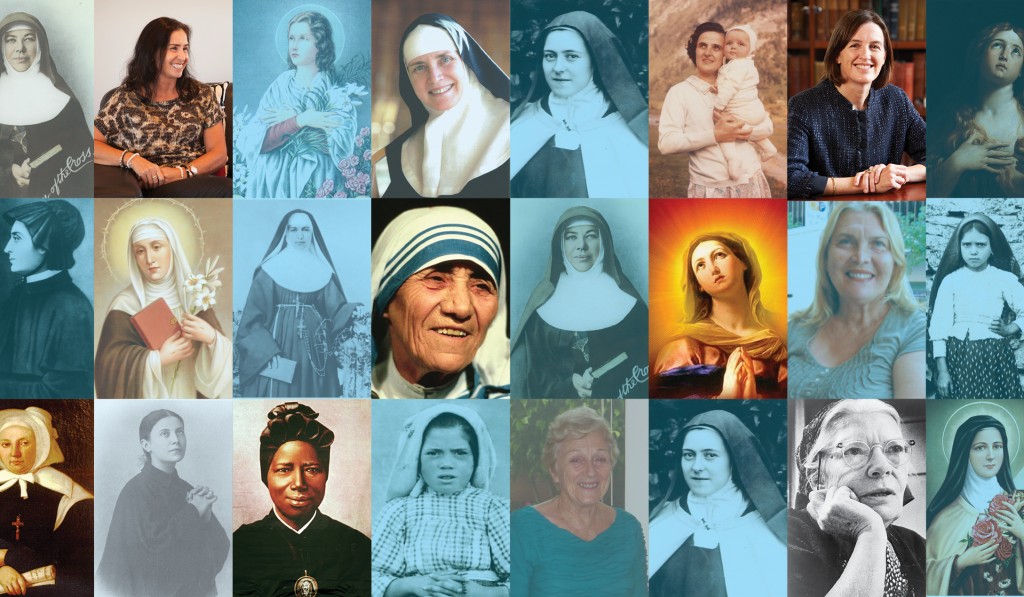
It is beyond question that we have to do much more in favour of women, said Pope Francis recently, as he began the first of two talks during his general audience on the Difference and complementarity between men and women.
“Making sure that women not only are listened to more, but that their voices carry real weight, and are an acknowledged authority in society and the Church,” he said, to applause.
To celebrate the role of women in the Church, the e-Record will publish a number of articles in each edition throughout the month of May – often referred to as the month of the Virgin Mary – highlighting the active role and witness that a number of women and organisations from across the Archdiocese of Perth provide in spreading the Gospel.
“A powerful guiding light,” the Pope went on to say, is “the way in which Jesus considered women,” especially in a social and historical context that was much “less favourable than ours” and in which women “were really in second place.”
“We still have not grasped fully the things that the feminine genius can give us, what society and we can be given by women who know how to see things with another pair of eyes that complement men’s ideas. It is a path to take with more creativity and audacity,” he said, to more applause.
In echoing the words of Pope Francis, Archdiocese of Perth Archbishop Timothy Costelloe said the role of women is important because the role of everyone is important.
“St Paul reminds us in one of his letters that there is ‘neither Jew nor Greek, slave nor free, male nor female, because we are all one in Christ Jesus’,” the Archbishop said.
“Because of our Baptism, every single one of us has both the privilege and the responsibility of being disciples of Christ and witnesses of His presence and action in our lives.
“We have been given the gift of faith and the Lord now asks us to allow Him to work through us to bring that gift to others. We do so by making all our gifts and talents available for this great task. One of these precious gifts is the gift of our own identity, including our sexual identity.”
St John Paul, a strong advocate for women in the Church, wrote a Letter to Women in June 1995 in anticipation of the Fourth World Conference on Women in Beijing.
“Thank you, every woman, for the simple fact of being a woman!” St John Paul wrote.
“Through the insight which is so much a part of your womanhood, you enrich the world’s understanding and help to make human relations more honest and authentic.”
St John Paul continued by calling on women to reflect anew on the magnificent passage in Scripture which describes the creation of the human race and which has so much to say about the dignity of women and their mission in the world.
“The Book of Genesis speaks of creation in summary fashion, in language which is poetic and symbolic, yet profoundly true: “God created man in His own image, in the image of God He created him; male and female He created them” (Gen 1:27). The creative act of God takes place according to a precise plan. First of all, we are told that the human being is created “in the image and likeness of God” (cf Gen 1:26). This expression immediately makes clear what is distinct about the human being with regard to the rest of creation.
“We are then told that, from the very beginning, man has been created “male and female” (Gen 1:27). Scripture itself provides the interpretation of this fact: even though man is surrounded by the innumerable creatures of the created world, he realises that he is alone (cf Gen 2:20). God intervenes in order to help him escape from this situation of solitude: “It is not good that the man should be alone; I will make him a helper fit for him” (Gen 2:18).
“The creation of woman is thus marked from the outset by the principle of help: a help which is not one-sided but mutual. Woman complements man, just as man complements woman: men and women are complementary. Womanhood expresses the “human” as much as manhood does, but in a different and complementary way.
In the history of the Catholic Church, laywomen and women in religious institutes have played a variety of roles and the Church has affected societal attitudes to women throughout the world in significant ways.
Women constitute the majority of members of the consecrated life within the Catholic Church: in 2010, there were around 721,935 professed religious women.
Prominent women in the life of the Church have included those from Old Testament figures, to the Virgin Mary and female disciples of Jesus, to theologians, abbesses, monarchs, missionaries, mystics, martyrs, scientists, nurses, hospital administrators, educationalists and religious sisters.
Motherhood is also given an exalted status within the Catholic faith, with Mary the Mother of Jesus officially known as Queen of Heaven.
The special role and devotion accorded to Mary and Marian devotion has also been a central theme of Catholic art.